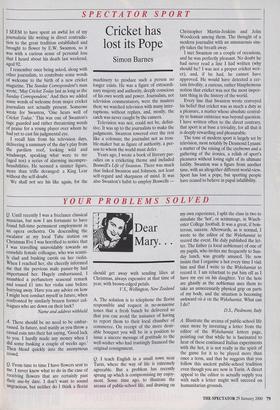SPECTATOR SPORT
Cricket has lost its Pope
Simon Barnes
I SEEM to have spent an awful lot of my Journalistic life writing in direct contradic- tion to the great tradition established and brought to flower by E.W. Swanton, so it was with a curious sense of personal loss that I heard about his death last weekend, aged 92.
I remember once being asked, along with other journalists, to contribute some words of welcome to the birth of a new cricket magazine. The Sunday Correspondent's man wrote, 'May Cricket Today last as long as the Sunday Correspondent.' And then we added some words of welcome from major cricket Journalists not actually present. Someone wrote for Swanton, 'One hears well of Cricket Today.' This was one of Swanton's tags: guarded and rather threatening words of praise for a young player over whom he had yet to cast his judgmental eye.
I recall him from his television days, delivering a summary of the day's play from the pavilion roof, looking wild and windswept, speaking what were to me (aged ten) a series of alarming incompre- hensibilities. He seemed a sinister figure, more than trifle deranged: a King Lear Without the self-doubt.
We shall not see his like again, for the machinery to produce such a person no longer exists. He was a figure of extraordi- nary majesty and authority, deeply conscious of his own worth and power. Journalists, not television commentators, were the masters then; we watched television with many inter- ruptions, without replays, and, mostly, the catch was never caught by the camera. Television was not, could not be, defini- tive. It was up to the journalists to make the judgments. Swanton towered over the rest like a colossus; the journalist not as trou- ble-maker but as figure of authority, a per- son to whom the world must defer.
Years ago, I wrote a book of literary par- odies on a cricketing theme and included Boswell's Life of Swanton. There was much that linked Swanton and Johnson, not least self-regard and sharpness of mind. It was also Swanton's habit to employ Boswells --- Christopher Martin-Jenkins and John Woodcock among them. The thought of a modern journalist with an amanuensis sim- ply takes the breath away.
I met Swanton on a couple of occasions, and he was perfectly pleasant. No doubt he had never read a line I had written (why should he? I was not a proper cricket writ- er), and, if he had, he cannot have approved. He would have detected a cer- tain frivolity, a curious, rather blasphemous notion that cricket was not the most impor- tant thing in the history of the world.
Every line that Swanton wrote conveyed his belief that cricket was as much a duty as a pleasure, a matter whose absolute central- ity to human existence was beyond question. I have written often to the direct contrary, that sport is at base a triviality, for all that it is deeply rewarding and pleasurable.
The tone of modern sport is largely set by television, most notably by Desmond Lynam: a matter of the raising of the eyebrows and a gathering of the ironies, a relish of sport's pleastires without losing sight of its ultimate futility. Swanton was a figure from another time, with an altogether different world-view. Sport has lost a pope, but sporting people have ceased to believe in papal infallibility.


















































































 Previous page
Previous page